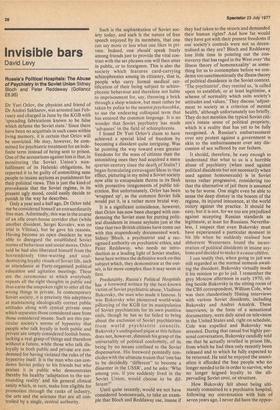Invisible bars
David Levy
Russia's Political Hospitals: The Abuse of Psychiatry in the Soviet Union Sidney Bloch and Peter Reddaway (Gollancz E6.95) Dr Yuri Orlov, the physicist and friend of Dr Andrei Sakharov, was arrested last February and charged in June by the KGB with 'spreading fabrications known to be false which defame the Soviet state.' Since there have been no acquittals in such cases within living memory, it is certain that Orlov will be convicted. He may, however, be committed for psychiatric treatment for an indefinite term instead of being sent to prison. One of the accusations against him is that, in monitoring the Soviet Union's nonfulfilment of its Helsinki obligations, he reported it to be guilty of committing sane people to insane asylums as punishment for their political views. This is just the kind of provokatsia that the Soviet regime, in its present ugly mood, could easily decide to punish in the way he describes.
Only a year and a half ago, Dr Orlov told me he considered himself an extraordinarily free man. Admittedly, this was in the course of an idle court-house corridor chat (while another dissident, Sergei Kovalev, was on trial in Vilnius), but he gave his reasons. Having become an open dissident he was able to disregard the established Soviet norms of behaviour and social mores. Orlov said he had also liberated himself from the horrendously time-wasting and souldestroying loyalty rituals of Soviet life, such as attendance at Party-organised political education and agitation meetings. These are the ceremonies at which everybody repeats all the right thoughts in public and thus earns the unspoken right to utter all the wrong things in private. In contemporary Soviet society, it is precisely this adeptness at maintaining ideologically correct public attitudes along with cynical private ones which separates those considered sane from those considered insane. Such are this particular society's norms of' hypocrisy that people who talk loyally in both public and private are simply considered foolish bores, lacking a real grasp of things and therefore without a future, while those who talk disloyally in both public and private are condemned for having violated the rules of the hypocrisy itself. It is the man who can condemn Soviet policy to his friends but who praises it in public who demonstrates thereby his healthy 'adaptation to the surrounding reality' and his general clinical sanity which, in turn, make him eligible for promotion through the ranks of industry, the arts and the sciences that are all controlled by a single, central authority. , Such is the sophistication of Soviet society today, and such i's the nature of free speech enjoyed by its members, that one can say more or less what one likes in private. Indeed, one should speak freely among friends just to provide the vital contrast with the set phrases one will then utter in public, or to foreigners. This is also the society which features card-carrying schizophrenics among its citizenry, that is, people who carry formal medical certification of their being subject to schizophrenic behaviour and therefore not liable to imprisonment for, say, throwing a brick through a shop window, but must rather be taken by police to the nearest psychooshka, to use the endearing colloquial term that has entered the common language. It is no wonder that Soviet psychiatry has made `advances' in the field of schizophrenia.
I found Dr Yuri Orlov's claim to have achieved a special kind of freedom by becoming a dissident quite intriguing. Was he pointing the way toward even greater freedoms for the mass of citizens than the astonishing ones they had acquired a mere quarter-century since the death, of Stalin? I began formulating extravaganadeas to that effect, picturing in my mind a Soviet society now able to encapsulate thorns in its flesh with protective integuments of public toleration. But unfortunately, Orlov has been 'wrapped up', as the common Soviet folk would put it, in a rather more brutal way.
It is a significant coincidence, however, that Orlov has now been charged with condemning the Soviet state for putting political dissidents in insane asylums just at the time that two British citizens have come out with this stupendously documented work. Sidney Bloch, a psychiatrist and a recognised authority on psychiatric ethics, and Peter Reddaway, who needs no introduction as a leading light of Soviet studies, have here written the definitive work on this subject which, they demonstrate at the outset, is far more complex than it may seem at first.
Predictably, Russia's Political Hospitals has a foreword written by the best-known victim of Soviet psychiatric abuse, Vladimir Bukovsky, the man who made it famous. It was Bukovsky who pioneered world-wide pillorying of the KGB for its manipulation of Soviet psychiatrists for its own punitive ends, though he has so far failed to bring about the exclusion of Soviet psychiatrists from world psychiatric councils. Bukovsky's undisguised pique at this failure does not, however, diminish his grasp of the universality of political conformity, of its being by no means confined to the Soviet dispensation. His foreword pointedly concludes with the ultimate truism that 'one has to be decidedly "different" to become a dissenter in the USSR', and he asks: 'Who among you, if you suddenly lived in the Soviet Union, would choose to be different?'
Until quite recently, would we not have considered homosexuals, to take an example that Bloch and Reddaway use, insane if they had taken to the streets and demanded their human rights? And how far would they have got with their present freedoms if our society's controls were not as decentralised as they are? Bloch and Reddaway lose little time in pointing out the controversy that has raged in the West over 'the illness theory of homosexuality' as something for us to contemplate before we condemn too sanctimoniously the illness theory of political dissidence in the Soviet context. 'The psychiatrist', they remind us, 'is called upon to establish, or at least legitimise, a scheme of normality which suits society's attitudes and values.' They discuss 'adjustment to society as a criterion of mental health,' although unfortunately too briefly. They do not mention the typical Soviet citizen's innate sense of political propriety, which is a reality that has yet to be fully recognised. A Russian's embarrassment over any protest against a government is akin to the embarrassment over any discussion of sex suffered by our fathers.
It should, therefore, be easy enough to understand that what to us is a horrible abuse of psychiatry (when used against political dissidents but not necessarily when used against homosexuals) is in Soviet terms rather progressive, considering too that the alternative of jail there is assumed to be far worse. One might even be able to sense the deep dismay in the bosom of the regime, its injured innocence, at the world outcry against the practice. It should be easy, but it is not, for we too are prejudiced against accepting Russian standards as legitimate, at least for Russians. Nevertheless, I suspect that even Bukovsky must have experienced a particular moment in his life when he suddenly realised how abhorrent Westerners found the incarceration of political dissidents in insane asylums and decided to make it a cause ce/ebre.
I can testify that, when going to jail was still regarded as the normal nemesis awaiting the dissident, Bukovsky virtually made it his mission to go to jail. I remember the grey Moscow afternoon in early 1970, sitting beside Bukovsky in the sitting room of' the CBS correspondent, William Cole, who was then clandestinely filming interviews with various Soviet dissidents, including Bukovsky and Andrei Amalrik. These interviews, in the form of a sensational documentary, were duly aired on television in the United States and, right on schedule, Cole was expelled and Bukovsky was arrested. During that casual but highly personal conversation, Bukovsky candidly told me that he actually revelled in prison life, from which he had then only recently been released and to which he fully expected to be returned. He said he enjoyed the association it afforded the free people who no longer needed to lie in order to survive, who no longer feigned loyalty to the allpervading Soviet stroi, or structure.
How Bukovsky felt about being ultimately committed to a psychiatric hospital, following my conversation with him of seven years ago, I never did have the oppor
tunity to find out. His interviews are unfortunately no longer free, now that he is in the West; they are in fact rather pricy. However, it is of the essence of his heroism under detention that his psychiatric 'treatment' deprived hini precisely of the freedom he saw in Soviet prison life to say what he liked. The more freely you talk in the psychooshka, the longer you are likely to stay there. With or without this new book, and whatever the significance of Bukovsky's view of prison freedom, there is no longer any doubt that the psychiatric hospital is now the half-way house between the physical freedom of ordinary Soviet life and the moral freedom found only in an orthodox Soviet prison.







































 Previous page
Previous page